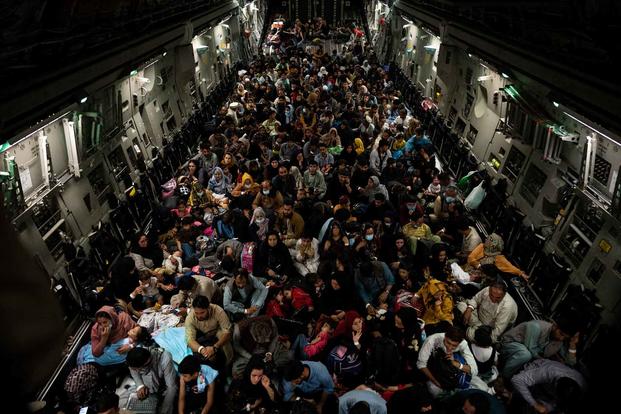More than 100 airmen are finally receiving awards for evacuating thousands of people from Afghanistan following the fall of Kabul last year.
In total, 96 Distinguished Flying Crosses, 12 Bronze Star Medals, and one Gallant Unit Citation will be awarded to airmen with Air Mobility Command who assisted with Operation Allies Refuge, which was the largest noncombatant air evacuation operation in U.S. history.
Seven of the Distinguished Flying Crosses will be awarded with the "V" device for valor, "recognizing heroism beyond what is normally expected while engaged in direct combat conditions," Air Mobility Command said in a release Monday.
Read Next: After Struggle, Ukraine Claims Success in Downing Drones
"The world witnessed history during that airlift, borne on the shoulders of mobility heroes," Gen. Mike Minihan, head of Air Mobility Command, said Monday in a press release. "This recognition is long overdue for what our heroes did during those historic 17 days."
News of the awards follows months of delays in getting service members recognition for assisting with the operations, with Air Force leadership previously saying that a review backlog would likely remain into next year. Minihan admitted the backlog was a nuisance and said the service should have recognized these airmen's efforts sooner.
"Make no mistake, we should have done this last year immediately after the operation, and I recognize our Airmen's frustration with the process," Minihan said in a press release. "We're making that right, and we've worked with our partners across the Air Force to ensure AMC is able to swiftly and effectively recognize our mobility warriors."
Air Mobility Command, Air Forces Central and the Department of the Air Force have changed how the awards are being considered, the service's Oct. 21 awards announcement said. Now, Air Mobility Command has the authority to convene its own boards to approve certain awards moving forward. Calls and emails to Air Mobility Command asking for information on the change were not immediately returned before publication.
The 621st Contingency Response Group is receiving the unit citation for repairing and running the airfield at Hamid Karzai International Airport "while surrounded by hostile forces, enabling success of the operation," the press release said.
Typically, Distinguished Flying Crosses and Bronze Stars are awarded to service members in direct combat operations. Air Mobility Command often supports those missions by delivering airmen and munitions to the fight.
In this case, Air Mobility Command had primary responsibility for Operation Allies Refuge, which involved moving more than 120,000 people under fire.
The Afghanistan evacuation effort saw the final U.S. casualties of the war when a suicide bomber struck at the airport's Abbey Gate on Aug. 26, killing 13 troops -- 11 Marines, a sailor and a soldier; wounding more than 20 other troops; and killing or wounding hundreds of Afghans.
This first batch of awards is just a small part of the total the service is bestowing on airmen. The 96 Distinguished Flying Crosses and 12 Bronze Star Medals were among 350 additional individual awards approved for Operation Allies Refuge.
Individual commanders have approved more than 4,500 medals for Mobility Air Forces airmen who supported the operation that didn't require a board review, according to the service.
Minihan will deliver the first approved awards in-person during a scheduled base visit at Joint Base McGuire-Dix-Lakehurst, New Jersey, in November.
The awards and recognition of the chaotic Afghanistan evacuation mission come as service members and veterans continue to grapple emotionally and mentally a year later. A survey released in August of 1,450 military community members who helped with the evacuation found that 41% of those who answered reported suffering from trauma as a result of the withdrawal.
-- Thomas Novelly can be reached at thomas.novelly@military.com. Follow him on Twitter @TomNovelly.











